
Leave message
Can’t find what you’re looking for?
Fill out this form to inquire about our custom protein services!
Inquire about our Custom Services >>


































 Limited Edition Golden Llama is here! Check out how you can get one.
Limited Edition Golden Llama is here! Check out how you can get one.  Limited Edition Golden Llama is here! Check out how you can get one.
Limited Edition Golden Llama is here! Check out how you can get one.
 Offering SPR-BLI Services - Proteins provided for free!
Offering SPR-BLI Services - Proteins provided for free! Get your ComboX free sample to test now!
Get your ComboX free sample to test now!
 Time Limited Offer: Welcome Gift for New Customers !
Time Limited Offer: Welcome Gift for New Customers !  Shipping Price Reduction for EU Regions
Shipping Price Reduction for EU Regions
> Proteínas CD3: objetivo importante para el anticuerpo biespecífico

Los anticuerpos biespecíficos de células T (TCB) son moléculas diseñadas para incluir sitios de unión al receptor de células T (TCR) y a antígenos asociados o específicos del tumor dentro de una única entidad. Uno de los TCB más estudiados en la inmunoterapia del cáncer es el CD3, una molécula que tiene la función de estabilizar la estructura del TCR y transmitir señales de activación.
Los anticuerpos contra las moléculas CD3 pueden estimular o bloquear la transducción de señales de activación de las células T. Además, estos anticuerpos pueden eliminar las células T efectoras o inducir un fenotipo regulador en las células T, proporcionando así un nuevo método para el tratamiento del rechazo de los trasplantes de órganos y las enfermedades autoinmunes. Estas moléculas CD3 se unen al TCR de forma no covalente para formar un complejo receptor TCR/CD3 en la superficie de la célula T.
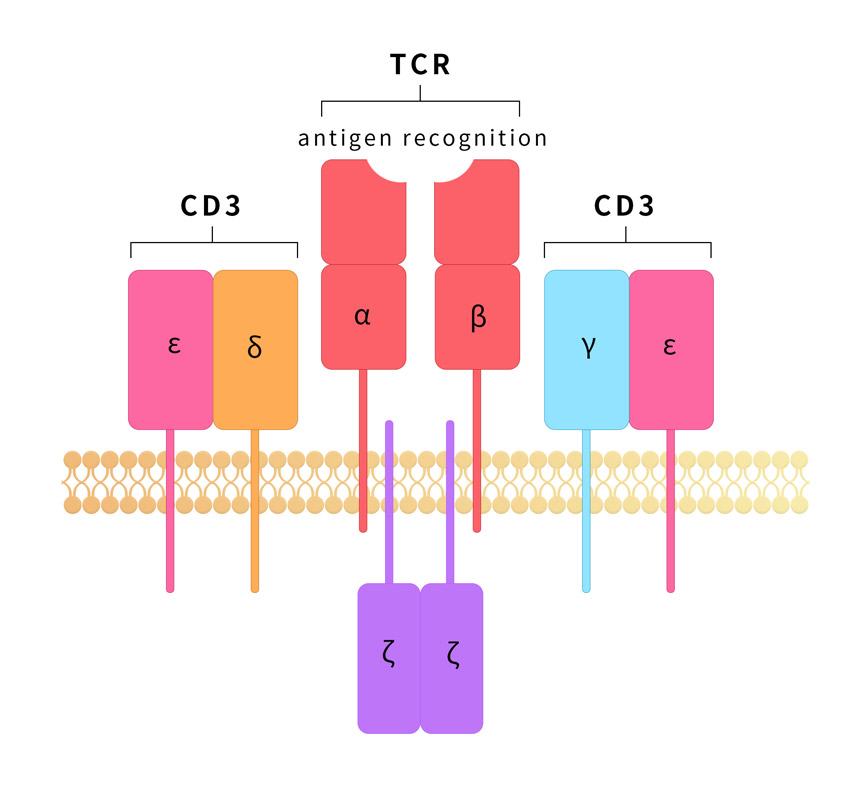
Hay 4 subtipos de CD3, incluyendo CD3δ, CD3ε, CD3γ y CD3ζ. CD3δ/CD3ε y CD3γ/CD3ε pueden formar los complejos TCR-CD3 a través de la cadena α/β del TCR como heterodímeros. El anticuerpo terapéutico dirigido a CD3 suele reconocer el CD3ε en el complejo del heterodímero para activar la actividad antitumoral de las células T. Sin embargo, en el proceso de expresión recombinante, CD3ε y CD3δ pueden formar aleatoriamente complejos heterogéneos incorrectos, lo que puede conducir a la pérdida de bioactividad y a una alta inconsistencia entre lotes.
Para acelerar la investigación y el desarrollo de anticuerpos biespecíficos, ACROBiosystems ha desarrollado una serie de proteínas CD3δ/CD3ε y CD3γ/CD3ε homogéneas de alta bioactividad. Estas proteínas se verifican como un heterodímero 1:1 mediante electroforesis no reductora y MALS respectivamente. Además, los datos de los clientes sugieren que los productos de anticuerpos biespecíficos de ACROBiosystems pueden utilizarse en aplicaciones que incluyen, entre otras, la farmacocinética clínica, el cribado de anticuerpos terapéuticos, la identificación y la caracterización.
Sucesivamente, la calidad superior de nuestro producto CD3 ayudó a acelerar el desarrollo clínico de un anticuerpo biespecífico en un agente terapéutico. Haga clic aquí para descargar el póster del CD3.
![]() Catálogo más amplio de productos
Catálogo más amplio de productos
5 moléculas: CD3ε & CD3δ, CD3ε & CD3γ, CD3ε, CD3δ, CD3γ |
Varias etiquetas: His, His&Avi, Fc, Llama Fc, Bandera |
Varias especies: Humano, Ratón, Macaco Cinomolgo, Rata, Conejo |
![]() Estructura homogénea: CD3ε& CD3δ y CD3ε& CD3γ se verifican como heterodímeros 1:1 mediante electroforesis no reductora y MALS
Estructura homogénea: CD3ε& CD3δ y CD3ε& CD3γ se verifican como heterodímeros 1:1 mediante electroforesis no reductora y MALS
![]() Alta bioactividad verificada por la unión con anticuerpos comunes como OKT3, SP34-2, UCHT1 y BCMA×CD3
Alta bioactividad verificada por la unión con anticuerpos comunes como OKT3, SP34-2, UCHT1 y BCMA×CD3
![]() Alta consistencia entre lotes garantizada por un estricto control de calidad
Alta consistencia entre lotes garantizada por un estricto control de calidad
![]() Adecuado para diferentes aplicaciones incluyendo la detección inmunológica de anticuerpos, el biopaneo, el cribado de anticuerpos, la caracterización de la afinidad y el ensayo farmacocinético clínico
Adecuado para diferentes aplicaciones incluyendo la detección inmunológica de anticuerpos, el biopaneo, el cribado de anticuerpos, la caracterización de la afinidad y el ensayo farmacocinético clínico
CD3E & CD3D
CD3E & CD3G
CD3 epsilon
CD3 delta
CD3 gamma
| Molécula | Cat. No. | Anfitrión | Descripción del producto | Estructura |
|---|
| Molécula | Cat. No. | Anfitrión | Descripción del producto | Estructura |
|---|
| Molécula | Cat. No. | Anfitrión | Descripción del producto | Estructura |
|---|
| Molécula | Cat. No. | Anfitrión | Descripción del producto | Estructura |
|---|
| Molécula | Cat. No. | Anfitrión | Descripción del producto | Estructura |
|---|
Haga clic en la molécula para descubrir sus interesantes productos.
ACROBiosystems has developed a series of homogeneous CD3 proteins with good bioactivity, which are verified as 1:1 heterodimer by nonreductive electrophoresis and MALS.
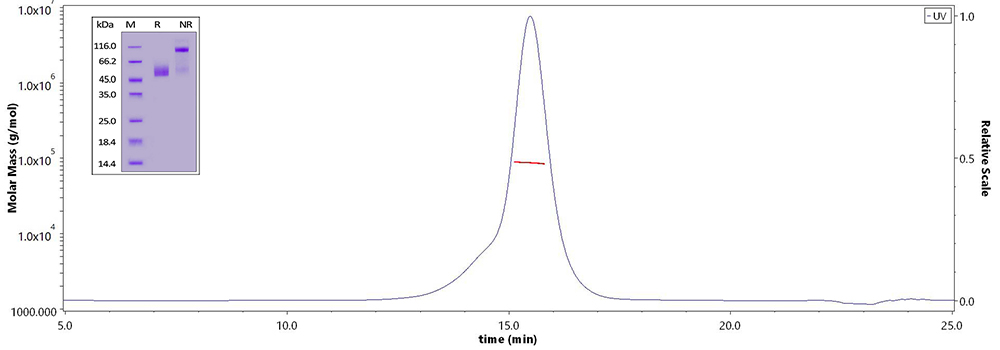
Fig.1 Human CD3E&CD3D Heterodimer Protein (Cat. No. CDD-H52Wa) on SDS-PAGE under reducing (R) and non-reducing(NR)condition and the purity of the protein is greater than 95%. The purity of the protein is more than 85% and around 80-90 kDa verified by SEC-MALS.
These verified authentic 1:1 heterodimer proteins show high bioactivity in different applications. The products are homogenous with strict quality control to guarantee the minimal batch-to-batch differences.
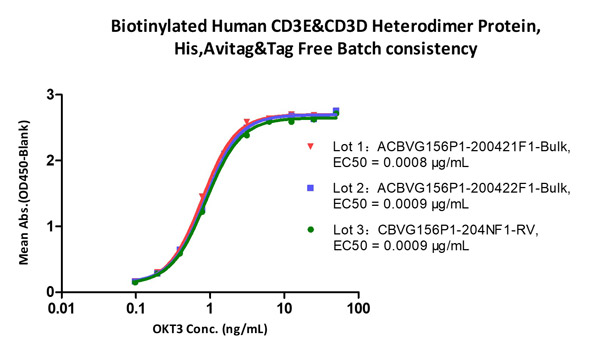
Fig.2 Immobilized Biotinylated Human CD3E&CD3D Heterodimer Protein, His,Avitag&Tag Free (Cat. No. CDD-H82W6) at 1 μg/mL (100 μL/well) on Streptavidin (Cat. No. STN-N5116) precoated (0.5 μg/well) plate, can bind Monoclonal Anti-Human CD3 Antibody, Mouse IgG2a (Cat. No. CDE-M120a) with a linear range of 0.2-6 ng/mL (QC tested), and batch differences EC50<0.0001 μg/mL.
These products are suitable for various applications at different stages of drug development, such as antibody immunotiter detection, biopanning, antibody screening, affinity characterization and clinical pharmacokinetic assays.
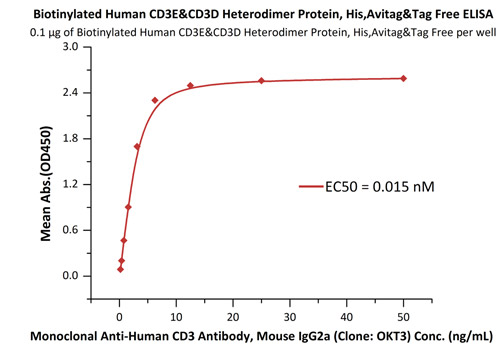
Fig.3 Immobilized Biotinylated Human CD3E&CD3D Heterodimer Protein, His,Avitag&Tag Free (Cat. No. CDD-H82W6) at 1 μg/mL (100 μL/well) on streptavidin precoated (0.5 μg/well) plate, can bind Monoclonal Anti-Human CD3 Antibody, Mouse IgG2a (Cat. No. CDE-M120a) with a linear range of 0.2-6 ng/mL.
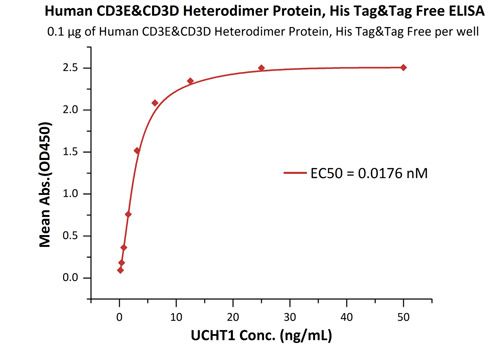
Fig.4 Immobilized Human CD3E&CD3D Heterodimer Protein, His Tag&Tag Free (Cat. No. CDD-H52W1) at 1 μg/mL (100 μL/well) can bind Anti-CD3 antibody with a linear range of 0.2-6 ng/mL.
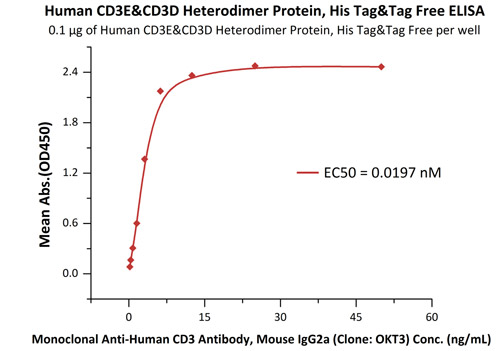
Fig.5 Immobilized Human CD3E&CD3D Heterodimer Protein, His Tag&Tag Free (Cat. No. CDD-H52W1) at 1 μg/mL (100 μL/well) can bind Monoclonal Anti-Human CD3 Antibody, Mouse IgG2a (Cat. No. CDE-M120a) with a linear range of 0.2-6 ng/mL.
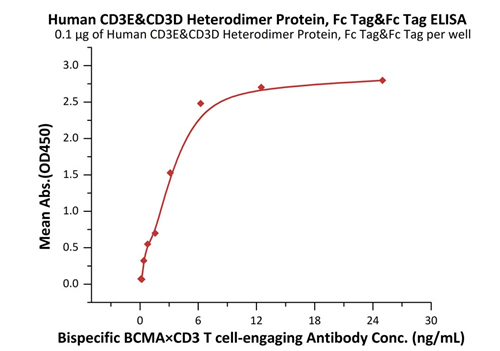
Fig.6 Immobilized Human CD3E&CD3D Heterodimer Protein, Fc Tag&Fc Tag (Cat. No. CDD-H5255) at 1 μg/mL (100 μL/well) can bind Bispecific BCMA×CD3 T cell-engaging Antibody with a linear range of 0.8-6 ng/mL.
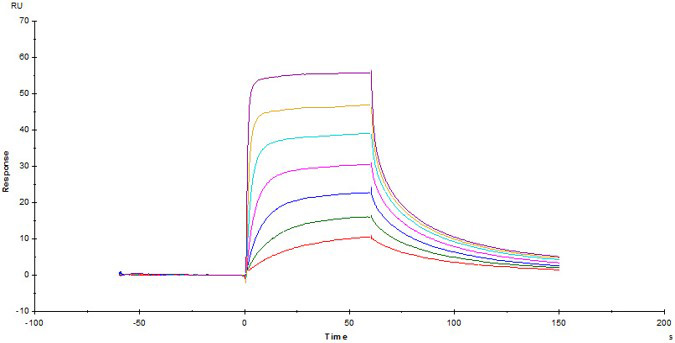
Fig.7 Biotinylated Human CD3E&CD3D Heterodimer Protein, His,Avitag&Tag Free (Cat. No. CDD-H82W6) captured on Biotin CAP - Series S sensor Chip can bind Anti-Human CD3 Antibody, Mouse IgG2a with an affinity constant of 22.5 nM as determined in a SPR assay (Biacore T200) .
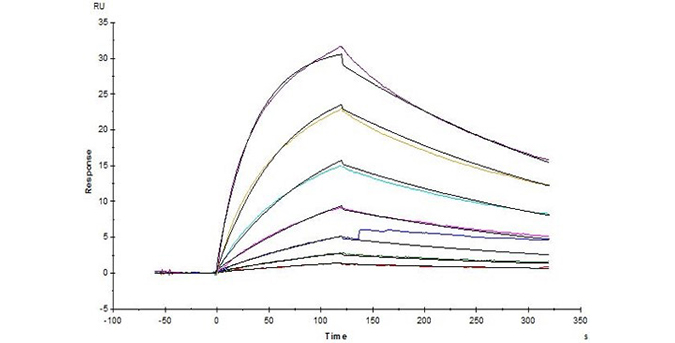
Fig.8 Bispecific T-cell Engager (CD3 X BCMA) immobilized on CM5 Chip can bind Human CD3E&CD3D Heterodimer Protein, His Tag&Tag Free (Cat. No. CDD-H52W1) with an affinity constant of 31.8 nM as determined in a SPR assay (Biacore T200).
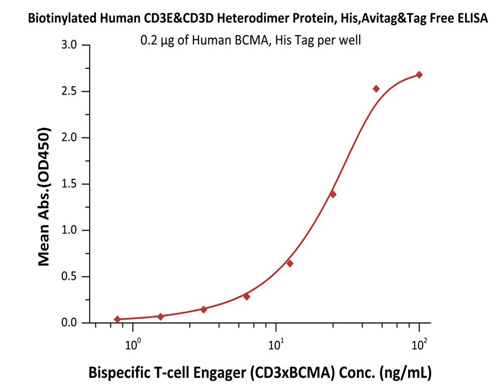
Fig.9 Immobilized Human BCMA, His Tag (Cat. No. BCA-H522y) at 2 μg/mL, add increasing concentrations of Bispecific T cell Engager (CD3 X BCMA) in 10% human serum and then add Biotinylated Human CD3E&CD3D Heterodimer Protein, His,Avitag&Tag Free (Cat. No. CDD-H82W6) at 0.2 μg/mL. Detection was performed using HRP-conjugated streptavidin with sensitivity of 15 ng/mL.
This web search service is supported by Google Inc.








